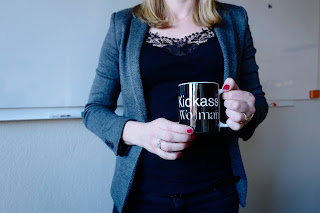Šta to (de)motiviše žene da uđu u svet preduzetništva?
 |
| Izvor: Unsplash |
Takođe, programi su najčešće otvoreni za privredna društva firme dok su žene sklonije osnivanju preduzetničkih radnji. Specifičnost ženskog preduzetništva je taj što su to uglavnom mikrobiznisi (zapošljavaju do 10 osoba), najčešće su u udruženjima na rukovodećim pozicijama, a potom i u uslužnim delatnostima, kao što su frizerski i kozmetički saloni, računovodstveni, knjigovodstveni i revizorski poslovi, restorani i ugostiteljski poslovi. Prema istraživanju koje je objavio dnevni list „Danas“, oko 30% preduzetnika su žene, što je isti broj žena i na rukovodećim pozicijama, u korist 70% muškaraca. Ipak, žene prednjače u drugoj vrsti podataka – 40% preduzetnika koji ugase svoj biznis u prvih pet godina postojanja su upravo – žene.
Izazovi za žene u preduzetništvu
- Trećina ulaže porodični novac;
Kako
„pronatalitetna politika“ destimuliše preduzetništvo kod žena?
U kampanji “Pravo za mame”
koja je započeta 2013., a realizovana 2014. godine, moj motiv za učešće je bio
da se izmeni tadašnji član 13. i porodiljska naknada, koja je bila prosek
primanja u poslednjih 12 meseci pre odlaska na bolovanje, bude isplaćena direktno
od strane države, kao I druga socijalna davanja (penzije, dečiji/roditeljski
dodatak…). U kampanji koju su inicirala tri udruženja, učestvovalo je 250 žena,
mama i trudnica, koje su razgovarale sa narodnim poslanicima tadašnjeg saziva
Narodne skupštine Republike Srbije, gde je oko 160 poslanika podržalo
inicijativu, garantujući da će glasati za ovu izmenu Zakona, kada na to dođe
red. Zakon je usvojen 1. januara 2018. godine, a počeo sa primenom 1. jula iste
godine. |
| Izvor: Unsplash |
Na jedno dobro, došlo je više loših rešenja u Zakonu:
Umesto zaključka
Na samom kraju, istrajava utisak da podrška ženskom preduzetništvu ima višestruke posledice po društvo:
- Osim većeg stepena zapošljavanja,
What (de)motivates women to enter the world of entrepreneurship?
According to the research "Gender analysis of economic programs and financial measures in Serbia" from 2016, conducted for the needs of UN Women by NALED, the most dominant motive for women who engage in entrepreneurship, the balance of private and business life is mentioned. Women are more burdened than men with unpaid household chores, which also affects the income side because they receive significantly lower salaries and pensions than men. The results of the project showed that women own only 31% of entrepreneurial shops in Serbia. Among the companies that have so far received any financial resources in competitions to support business development, only one in five is the owner.
Also, programs are most often open to company firms while women are more inclined to establish entrepreneurial businesses. The specificity of women's entrepreneurship is that they are mainly microbusiness (employing up to 10 people), most often in associations in management positions, and then in service activities, such as hairdressing and beauty salons, accounting, bookkeeping and auditing, restaurants and catering. According to a survey published by the daily Danas, about 30% of entrepreneurs are women, which is the same number of women in management positions, in favor of 70% of men. However, women leaders in the second type of data - 40% of entrepreneurs who shut down their business in the first five years of existence are women.
Challenges for women in entrepreneurship
Among the more significant "challenges"
faced by women entrepreneurs are the poorly developed business network, less
frequent membership in professional associations, non-recognition of business
opportunities and the financial support they have, at the time of business
registration:
- Third invests family money;
- The second third invests its own money;
- Only 3.5% of women entrepreneurs received a
loan to start a business.
As the most common answer that prevents women from starting an entrepreneurial business, 60% of the answers to this research stated the issue of financing. Precisely because of that, the data available to the Commissioner for the Protection of Equality showed that there are 10% more women who close their shops, compared to the jobs run by men.
How does "pronatalist policy" discourage entrepreneurship among women?
In the "Right for Moms" campaign, which
started in 2013 and was implemented in 2014, my motive for participation was to
change the then Article 13 and maternity benefit, which was the average income
in the last 12 months before going on sick leave, be paid directly by the
state, as well as other social benefits (pensions, child / parental
allowance...).
The campaign, initiated by three associations, was attended by 250 women, mothers and pregnant women, who spoke with deputies of the then convocation of the National Assembly of the Republic of Serbia, where about 160 deputies supported the initiative, guaranteeing that they would vote for this amendment. it's time. The law was adopted on January 1st, 2018, and began to be applied on July 1st of the same year.
 |
| Source: Unsplash |
For one good thing, there have been several bad
solutions in the Law:
- The circle of women who have been provided with
maternity benefits has been expanded, such as farmers, BUT the farm must be
registered in their name, for a period of 24 months, taxes and contributions
must be paid (Article 17 of the Law).
- For women in managerial positions, the payment
of maternity benefits is limited to a maximum of three average salaries.
- For women entrepreneurs, maternity leave lasts
only one year, regardless of the order of birth of children - whether it is the
first, second or third, as is the case with other categories of women. During
the use of maternity leave, the entrepreneur must appoint a manager for the job
to continue working. The mother-mother received only a net part of the
compensation since the state does not pay her taxes and contributions.
- In Article 12 of the current Law, there was a
"condition" for children of parents with disabilities, that if they
use compensation during incapacity for work due to child care, they do not have
the right to help and care for another person and vice versa.
- The Commissioner for the Protection of
Equality, civil society organizations, and even MPs who submitted a
constitutional review before the Constitutional Court has repeatedly pointed
out the problematic application of the Law on Financial Support to Families
with Children.
Instead of a conclusion
The social context does not provide the
conditions for exercising the right to work and that the “challenges” imposed
on women are far more complex, to respond to them with short-term measures,
such as subsidies and/or loans. Creating a climate that stimulates (self)
employment of women and creates preconditions for adequate care for children,
is the best long-term measure of pronatalist policy that state institutions
should work on.
Finally, the impression persists that supporting
women's entrepreneurship has multiple consequences for society:
- In addition to a higher level of employment,
- It promotes the participation of women in the
labour market and has a direct consequence
- Better balance of private and business life.
All measures of "positive discrimination" are not only desirable but necessary so that we can talk about as many successful examples of women entrepreneurs in Serbia as possible.
Izvori/Sources:
Blog “Zakomplikovana u borbi protiv vetrenjača”:
- „Učešće žena u svetu preduzetništva“
- „Žena, majka... preduzetnica?“
Dnevni list „Danas“:
- „Na rukovodećim pozicijama samo 30% žena“
NALED:
- „Na jedan dinar podrške preduzetnicama, skoro pet za preduzetnike“
- „Women build less effective professional networks than men as they underestimate self – worth“
Talas:
- „Žensko preduzetništvo – kako stojimo?“
BBC na srpskom:
- „Žene i posao u Srbiji – Majka i vlasnica privatnog biznisa – „nije laka kombinacija“
Zakon o finansijskoj podršci porodici sa decom:
- Paragraf: Zakon o finansijskoj podršci porodici sa decom
- Kampanja „Pravo za mame“, Centar za mame
- „O Zakonu o finansijskoj podršci porodici sa decom i njegovim posledicama“
- Poverenica za zaštitu ravnopravnosti: „Inicijativa za izmenu Zakona o finansijskoj podršci porodici sa decom“


Comments
Post a Comment
Please be polite and concise. On this blog anyone opinion is appreciated, but we need to respect each other. If you like my direct response, feel free to write an email to empowera.consulting@gmail.com, and I will respond to you as soon as possible. Thank you in advance! Ana